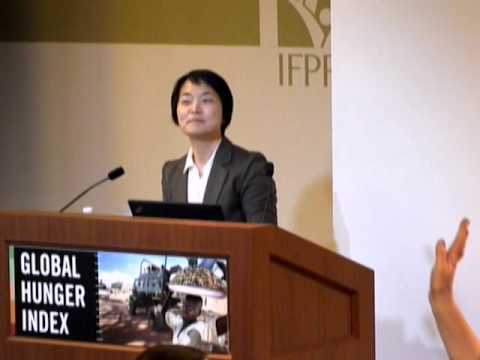Panelists at the Washington, DC launch of the 2015 Global Hunger Index (GHI) offered sobering facts and heartbreaking stories, but also cause for cautious optimism.
The 2015 Global Hunger Index—the tenth in an annual series produced by IFPRI, Concern Worldwide, and Welthungerhilfe that measures hunger globally, regionally, and nationally for 117 countries—shows progress, with a 27 percent fall in global hunger levels since 2000. However, it also reveals that hunger levels remain “serious” in 44 countries and “alarming” in 8 countries. Seventeen countries have reduced their hunger scores by at least half since 2000, with Rwanda, Angola, and Ethiopia presenting the most dramatic improvements. Yet even in these rapidly improving countries, hunger remains extremely high and it remains unknown if such progress can be sustained.
Maximo Torero, division director at IFPRI’s Markets, Trade, and Institutions Division, emphasized the need for better data in order to gain a more accurate picture of the true scale and reach of global hunger. “A lack of data obscures hunger,” he said, stressing that the data gap is most pronounced in countries that are potentially suffering the most.
“We need to find ways to resolve that gap to create a kind of early warning system so humanitarian aid can do a good job, and so we can trace what is going on,” Torero said.
There is a common characteristic in nearly all the countries that suffer the worst hunger: they are engaged in, or recently emerged from, armed conflict. This, argued Alex de Waal, executive director of the World Peace Foundation and professor at Tufts University, is no coincidence.
“There is a very clear correlation between armed conflict, totalitarian systems, and famine,” he told the audience.
De Waal, author of the 1997 book Famine Crimes, walked the audience through a carefully researched historical overview of how man-made conflict and political repression have resulted in “calamitous” famines—those that kill over a million people—from colonialism to the totalitarian regimes of Hitler and Stalin and the policies of Asian communism such as China’s “Great Leap Forward.” Throughout recorded history, he pointed out, the majority of famine-related deaths have taken place in Asia, followed by South Asia, Europe, and Africa.
He went on to offer a glimmer of good news: these calamitous famines seem to be behind us. “The famines of the last 40 years or so have been much smaller by historic levels,” he said. “Nothing like as bad as the famines of the previous decades.”
But, he asked, “Is it over?” The answer, sadly, is no.
According to de Waal, all measures of armed conflict and undernutriton have been going up in the last 7 to 8 years. The countries mired in conflict today–particularly Somalia, Yemen, Syria, and South Sudan–are mainly responsible for this uptick. These are conflicts with many unstable and splintering sides, making it extremely difficult to broker peace deals. And despite huge improvements in techniques and resources, humanitarian aid is constrained at both the country and global levels. In Somalia in 2012, for example, 250,000 people died because Al Shabab blocked aid. In Yemen and Syria today, it is US policies designed to keep resources out of the hands of terrorists that are blocking aid to innocent victims. “This policy is profoundly wrong,” de Waal declared. “And it is politically wrong. It implies that we don’t care.”
Connell Foley, director of strategy, advocacy and learning at Concern Worldwide, offered insight from his conversations with more than a hundred survivors of famine and war during a recent trip to South Sudan. Ntabok Wafed, a 60 year old woman, fled her village with no food, terrified by violence that intentionally targeted to women and children. She and thousands like her walked for weeks to the nearest refugee camp, surviving on water lilies, tree sap, and leaves.
“We are fighting three wars,” one survivor told Foley. “An internal war among ourselves, a war against the Republic of Sudan, and a war against hunger.”
The Global Hunger Index aims to raise awareness, highlight successes and failures, and offer incentives to support this war against hunger. “Our challenge going forward,” de Waal stated, “is to bring that line back down to zero.”







